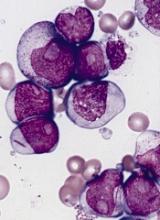The US Food and Drug Administration (FDA) has granted orphan drug designation to H3B-8800 as a treatment for patients with acute myelogenous leukemia (AML) or chronic myelomonocytic leukemia (CMML).
The FDA grants orphan designation to drugs and biologics intended to treat, diagnose, or prevent diseases/disorders that affect fewer than 200,000 people in the US.
The designation provides incentives for sponsors to develop products for rare diseases. This may include tax credits toward the cost of clinical trials, prescription drug user fee waivers, and 7 years of market exclusivity if the product is approved.
About H3B-8800
H3B-8800 is an orally bioavailable small-molecule modulator of wild-type and mutant SF3b complexes. The SF3b complex is a key component of the spliceosome that is found in the cell nucleus and is responsible for the removal of noncoding introns from a transcribed pre-messenger RNA.
Recurrent heterozygous mutations in several core members of the spliceosome (SF3B1, U2AF1, SRSF2, and ZRSR2) have been identified in solid tumor and hematologic malignancies. Mutations in the core spliceosome components lead to aberrant mRNA splicing that may contribute to disease pathogenesis.
Preclinical data have suggested that H3B-8800 modulates RNA splicing and shows preferential antitumor activity in spliceosome-mutant cancer models, including models of AML and CMML. H3B-8800 showed dose-dependent modulation of canonical and aberrant splicing when administered at tolerated doses.
Results from this research were presented at the 2017 AACR Annual Meeting (abstract 1185).
H3B-8800 is currently under investigation in a phase 1 trial of patients with AML, CMML, and myelodysplastic syndromes that may carry mutations in the core spliceosome genes.
H3B-8800 is being developed by H3 Biomedicine Inc.


